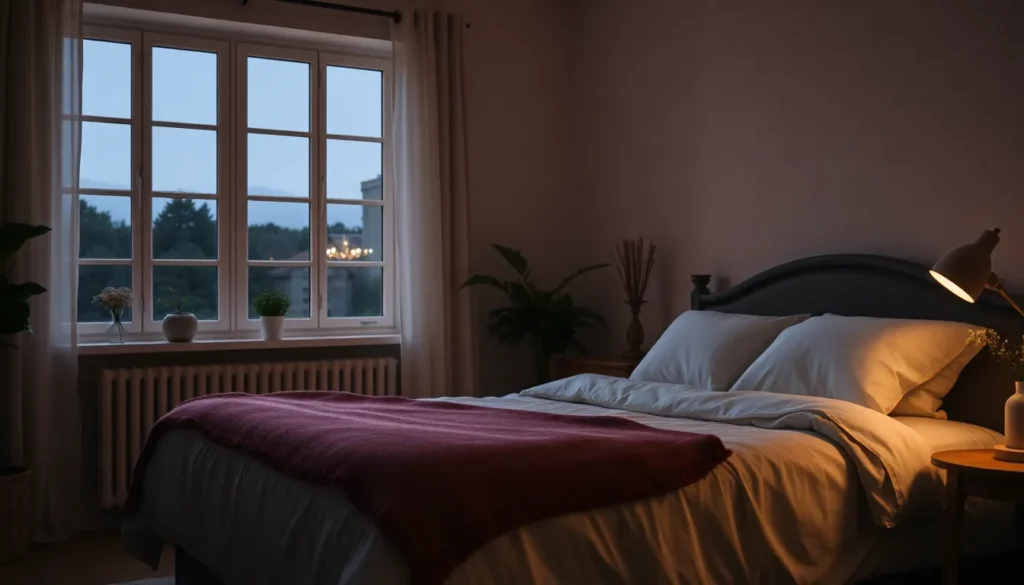In a world buzzing with notifications and endless to-do lists, finding that elusive sleep peace can feel like hunting for a unicorn in a haystack. But fear not! Achieving a serene slumber isn’t just a dream; it’s a reality waiting to be explored. Imagine drifting off to sleep like a baby, minus the drool and midnight cries.
Table of Contents
ToggleUnderstanding Sleep Peace
Sleep peace signifies a state of serene rest that allows for rejuvenation. This tranquility plays a crucial role in overall well-being, impacting mental clarity and emotional balance.
Definition and Importance
Sleep peace refers to the quality of rest that individuals experience during sleep. It transcends merely falling asleep; it encapsulates the depth and restorative nature of slumber. Attaining restful sleep influences productivity and mood. Studies indicate that adults require 7 to 9 hours of sleep per night for optimal functioning. Lack of sleep peace can lead to various health issues, including anxiety and cognitive decline. Prioritizing sleep quality fosters a healthier lifestyle, encouraging better decision-making and emotional stability.
The Science Behind Sleep Peace
Understanding sleep peace involves exploring the stages of sleep. Each cycle includes light and deep sleep phases. These stages contribute to physical recovery and brain function restoration. Research indicates that the body releases growth hormones during deep sleep, enhancing recovery and muscle repair. Neurotransmitters play a critical role in regulating sleep patterns. They help maintain balance between wakefulness and sleepiness. Factors such as sleep environment and stress levels can significantly impact sleep quality. Recognizing these elements enables individuals to create conducive conditions for achieving sleep peace.
Factors Affecting Sleep Peace


Multiple factors impact the quality of sleep peace. Understanding these influences helps in creating a conducive environment for restful slumber.
Environmental Influences
Light exposure plays a critical role in sleep quality. Bright light before bedtime can disrupt the body’s natural circadian rhythm. Noise, whether from traffic or household devices, often interrupts deep sleep stages, leading to frequent awakenings. Temperature control significantly contributes to comfort during sleep. A cool room, typically between 60°F and 67°F, promotes better sleep. Additionally, bedding quality affects comfort. Invest in a supportive mattress and soft pillows to enhance the sleep experience.
Lifestyle Choices
Regular exercise positively impacts sleep peace. Engaging in physical activity helps manage stress and anxiety, essential for restful sleep. Dining habits also influence sleep quality. Heavy meals before bedtime can lead to discomfort and disrupt sleep. Alcohol consumption may initially induce sleepiness but ultimately reduces sleep quality. Caffeine intake should be monitored as well; limiting it in the afternoon helps prevent interference with the ability to fall asleep. Developing a consistent bedtime routine significantly aids in signaling the body to prepare for restful sleep.
Benefits of Achieving Sleep Peace
Sleep peace plays a vital role in enhancing overall well-being. Attaining restful sleep not only improves physical health but also supports mental clarity and emotional stability.
Physical Health Advantages
Optimal sleep is essential for physical health. It supports immune function, enabling the body to fend off illnesses more effectively. Adequate sleep promotes heart health by regulating blood pressure and reducing the risk of cardiovascular issues. Weight management benefits from quality sleep as it helps maintain metabolic balance. Fulfilling the recommended 7 to 9 hours of sleep per night aids in muscle recovery post-exercise. The body repairs itself during sleep, which is crucial for recovery from daily wear and tear. Enhanced hormone regulation impacts appetite, ensuring a healthier lifestyle.
Mental Well-Being
Achieving sleep peace significantly influences mental well-being. Quality sleep enhances cognitive functions such as memory, focus, and problem-solving skills. Improved emotional balance occurs as restful sleep mitigates anxiety and stress. Better decision-making abilities stem from clearer thinking, which often comes with sufficient rest. Sleep peace fosters creativity by allowing the brain to reorganize information effectively overnight. Regular sleep patterns contribute to a more stable mood, helping individuals navigate challenges calmly. Prioritizing sleep transforms mental health, creating a foundation for emotional resilience.
Strategies to Attain Sleep Peace
Establishing a serene sleep experience involves several actionable strategies.
Creating a Sleep-Friendly Environment
A quiet space is essential for restful sleep. Dimming lights promotes relaxation and signals the body to unwind. Comfortable bedding can significantly enhance sleep quality, so invest in a supportive mattress and pillows. Temperature control plays a key role; keeping the bedroom cool between 60°F and 67°F supports better rest. Minimizing screen time before bed helps reduce exposure to blue light. A tidy, organized bedroom creates a calming space, free from distractions. Incorporating calming colors and scents, like lavender, fosters a tranquil atmosphere for sleep.
Relaxation Techniques
Incorporating relaxation techniques can boost sleep peace. Deep breathing exercises can calm the mind and body, promoting a sense of tranquility. Progressive muscle relaxation helps release tension, allowing the body to transition into a restful state. Meditation offers mental clarity, fostering a more peaceful mindset before bedtime. Listening to soothing music or nature sounds can create an ideal sleeping environment. Journaling before sleep helps to clear the mind of intrusive thoughts, facilitating a smoother transition to rest. Cultivating a consistent relaxation routine strengthens the body’s ability to prepare for sleep.
Achieving sleep peace is not just a luxury but a necessity for overall well-being. By recognizing the importance of quality sleep and implementing practical strategies, individuals can cultivate a serene sleep environment that promotes restful slumber. Prioritizing sleep hygiene and making mindful lifestyle choices can significantly enhance mental clarity and emotional balance.
As people embrace the journey towards better sleep, they’ll find that the benefits extend far beyond the night. With improved physical health and mental resilience, the pursuit of sleep peace ultimately transforms lives, paving the way for a healthier and more fulfilling existence.





